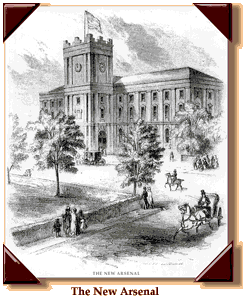United States Armory
|
Springfield Armory National Historic Site
|
|

19th-century view of the Main Arsenal
|
|
| Location | Armory Sq., Springfield, Massachusetts, United States |
|---|---|
| Coordinates | 42°6′29″N 72°34′54″W / 42.10806°N 72.58167°WCoordinates: 42°6′29″N 72°34′54″W / 42.10806°N 72.58167°W |
| Built | 1778 |
| Architectural style | Greek Revival |
| Website | Springfield Armory National Historic Site |
| NRHP Reference # | 66000898 |
| Significant dates | |
| Added to NRHP | October 15, 1966 |
| Designated NHLD | December 19, 1960 |
The Springfield Armory, located in the city of Springfield, Massachusetts, was the primary center for the manufacture of U.S. military firearms from 1777 until its closing in 1968. The site is preserved as the Springfield Armory National Historic Site, Western Massachusetts' only unit of the national park system. It features the world's largest collection of historic American firearms.
Famous first as the United States' primary arsenal during the American Revolutionary War, and then as the scene of a confrontation during Shays' Rebellion, the Springfield Armory in the 19th and 20th centuries became the site of numerous technological innovations of global importance, including interchangeable parts, the assembly line style of mass production, and modern business practices, such as hourly wages. Numerous firearm models produced at the Springfield Armory from 1794 to 1968 were referred to as "Springfield rifles".
Local and colonial militia used the bluff on which the Springfield Armory would become located during the 17th century for militia training, particularly after the Attack on Springfield during King Philip's War.
In 1777, during the American Revolutionary War, George Washington scouted and approved the site of the Springfield Armory, after it was referred to him by General Henry Knox, his artillery chief. Although a small town at the time, Springfield, Massachusetts, offered obvious geographical advantages—it lay at the intersection of three rivers (including the major Connecticut River), and four major roads headed toward New York City, Boston, Albany, New York, and Montreal. Additionally, Springfield is located just north of the Connecticut River's first waterfall (Enfield Falls), which is too steep to be navigated by ocean-going vessels. Thus, Springfield was the first town on the Connecticut River protected from attack by seafaring naval vessels.
...
Wikipedia


